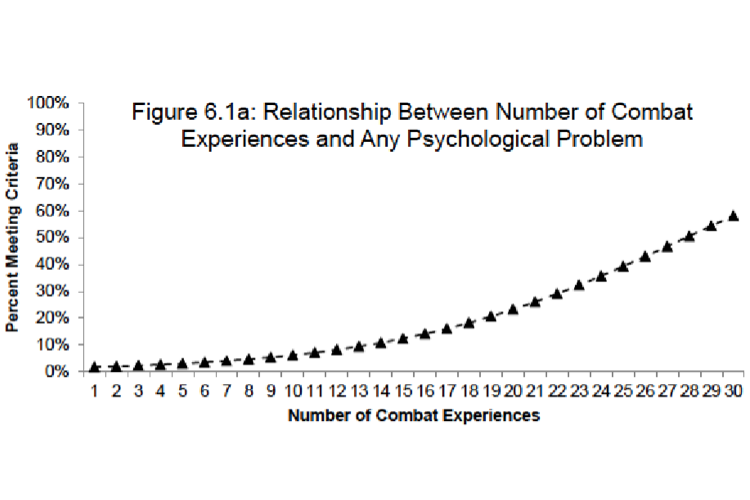
This Army graph makes crystal clear what many U.S. troops, and their loved ones, have long suspected: the more combat events they experience, the more mental-health problems they will suffer. In fact, according to this illustration from a new Army report, there is a direct linear relationship between combat exposure and resulting mental maladies.
While that notion is hardly surprising, this chart confirms what troops have long believed.
“As would be expected, there is a dose-dependent relationship between levels of combat experiences and well-being indices,” the Army’s just-released ninth Mental Health Advisory Team report says. “This relationship is clearly demonstrated for the percentage of Soldiers meeting screening criteria for any psychological problem.”
After years of debating to what degree repeated deployments and other factors play a role in post-traumatic stress and traumatic brain injuries—and the anxiety, depression and suicidal tendencies they can trigger—this chart indicates that it is the number of combat events, more than the time deployed, that drives up mental-health problems (of course, the two tend to travel together, but not always).
The U.S. military has been plagued by epidemics of mental-health problems since the wars in Afghanistan and Iraq began. The graphic shows that while troops can withstand several of what the Army calls “combat experiences,” their mental armor begins breaking down once they experience 10 or more such events.
To produce the chart, the Army tallied
— Threats (IED Exploded Near You)
— Fighting (Shooting at Enemy)
— Killing (Responsible for Death of Combatant)
and
— Death (Member of Unit Became Casualty)
…and added them together to come up with an average number of “combat experiences” per soldier:
Army
“Exposure to potentially traumatic experiences is one of the principal risk factors for behavioral health problems in combat settings,” the Army’s report says.
In a nutshell, repeated deployments lead to more combat experiences, which leads to more post-traumatic stress, traumatic brain injuries, anxiety, depression and suicide.
Bottom line: long wars require far bigger armies than the U.S. was willing to send to war post 9/11, assuming that keeping mental-health woes to a minimum was a priority.
More Must-Reads from TIME
- Donald Trump Is TIME's 2024 Person of the Year
- Why We Chose Trump as Person of the Year
- Is Intermittent Fasting Good or Bad for You?
- The 100 Must-Read Books of 2024
- The 20 Best Christmas TV Episodes
- Column: If Optimism Feels Ridiculous Now, Try Hope
- The Future of Climate Action Is Trade Policy
- Merle Bombardieri Is Helping People Make the Baby Decision
Contact us at letters@time.com